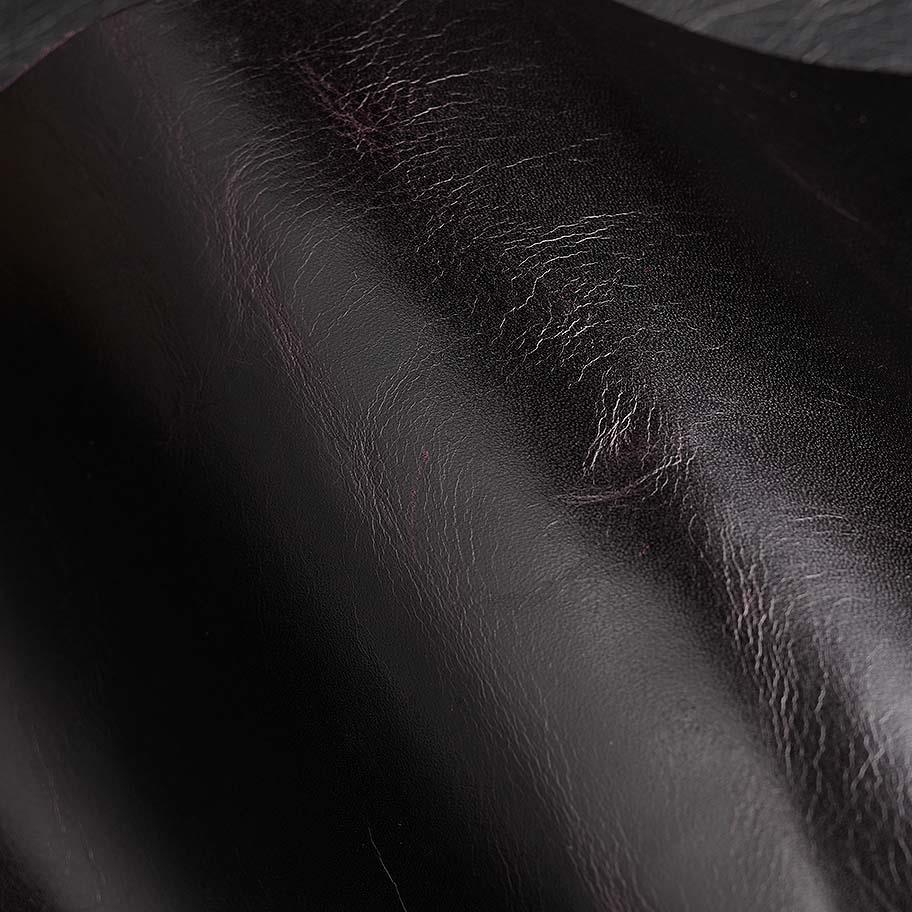PRODUCTS
Product Categories
LIKE US ON FACEBOOK
Product Information

Crystal
Colour : Aubergine 3387
Description :
Category : Semi -Aniline
Application : Furniture
Raw Material : North European Hides
Country of Production : Italy
Colour Checking : D65 Daylight
Appearance : Conform to the master
Thickness : 0.9 - 1.11mm
Average hide size : 50 - 55 sq ft
An aniline leather finished with a blend of oil and wax to achieve a cracked, almost distressed appearance with a slight pull-up effect. Suitable for domestic and contract applications.
Care Instructions
To maintain the initial characteristics of goods produced with our articles, it is recommended to follow these instructions: keep them in dry ambient at room temperature. Keep leather away from sunlight and from any sources of heat to avoid colour change and darkening.
Use only recommended leather cleaner and protector products. Totally avoid multi-purpose cleaning products. Before using cleaning product,try it on a hidden surface. Clean stains as fast as possible; beverage stains could be removed dabbing with blotting paper without rubbing, then pass gently a white wet cloth on the stain, from external to internal side. After drying, polish it with a soft dry cloth. For domestic furniture, fully clean and re-protect your leather furniture at least every six months. For contract furniture, we recommend a regular cleaning and maintenance program as often as necessary.
We recommend leather maintenance products by LCK International in Germany.
Technical Specification
Technical Specification
| CHARACTERISTIC | TEST METHOD | M.U. | PERFORMANCE |
| Thickness | ISO2589 | mm | 0.9-1.1 |
| Dry Rub Fastness | EN ISO 11640 | Grey Scale | Dry 250 cycles ≥ 4 |
| Wet Rub Fastness | EN ISO 11640 | Grey Scale | Wet 80 cycles ≥ 3/4 |
| Perspiration Rub Fastness | EN ISO 11641 | Grey Scale | Perspiration 50 cycles ≥ 3/4 |
| Finishing Adhesion | EN ISO 11644 | N/10 mm | ≥2 |
| Flexing Endurance | EN ISO 5402 | Visual | Dry 50,000 cycles (no cracks) |
| Colour Fastness to Light | EN ISO 105-B02 | Blue Scale | ≥4 |
| Tear Strength – Single edge | EN ISO 3377-1 | N | >20 |
| Tensile Strength | EN ISO 3376 | N/mm² | >10 |
| Colour Fastness to Water Spotting | EN ISO 15700 | Grey Scale | >3 |
| pH and ∆pH | EN ISO 4045 | Min 3,2 – ∆pH≤0.7 if pH<4 | Pass |
| Burning Behaviour to cigarette and match flame | BS 5852:1979-BS EN 1021-1/ EN 1021-2 | Pass | |
| Chemical Characteristic | Article processed in conformity with Reach regulation | ||
| Natural characteristics maybe visible and the colour may vary. |
Additional information
Characteristics not presented in this document are not applicable or not defined by producer. Additional requirements must be specified by the Customer before making the purchase order. Results of tested characteristics are an average of results found on standard productions. Eco and Environmental safety conformity to CE 1907/2006 REACH is assured until shipment. In case of further chemical treatments, it is the customer’s responsibility to verify the chemical compatibility and that the chemicals used, do not impact on the conformity of the leather. JMT Leather will not respond legally in case of missed indications checking. Hides must be worked maintaining an internal humidity of the hide of 10-12% and using a process temperature not higher than 60°C/140°F to avoid any change of the hides mechanical properties and aspect. Do not put over weights on hides during stock, same goes for finished furniture. Stock hides and finished furniture in dry ambient with temperature 15/40°C – 59/104°F. Avoid using any solvent or lotion because they could weaken finishing adhesion. Heat guns shrink wrapping and any other source of heat must be avoided. Avoid using any wrapping/packing material that may react with the leather or finished furniture. Natural growth features, colour and structure differences (uneven appearance) are indications of genuineness (visible/clearly visible). Natural defects such as scars, growth marks and insect bites are normal hide characteristics and are not part of the leather production process. The initial leather smell is typical of the material. Colour and structure differences compared with the sample furniture and leather specimens are possible.

